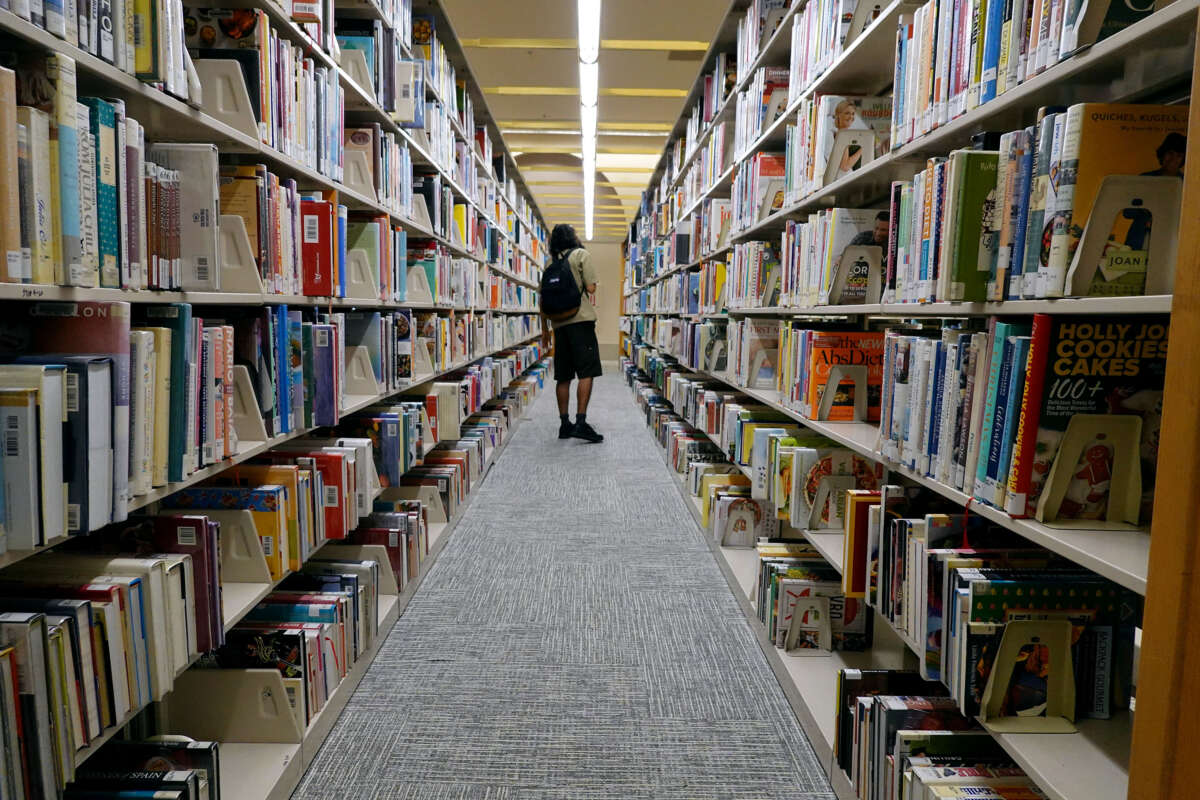Honest, paywall-free news is rare. Please support our boldly independent journalism with a donation of any size.
The school district superintendent of Charlotte County, Florida, has ordered librarians to remove all books and material containing LGBTQ+ characters from the district’s public school libraries.
Charlotte County Superintendent Mark Vianello and the school board’s attorney Michael McKinley told district librarians at a July meeting that the purging of LGBTQ+ books from libraries and classrooms was necessary to conform with the state’s “Don’t Say Gay” law, which was passed in March 2022 and expanded to all grades PreK-12 in May.
The meeting was organized to address concerns from district librarians who were seeking guidance on how to interpret a revised version of The Principles of Professional Conduct for the Education Profession in Florida, which was rewritten in response to the state’s “Don’t Say Gay” law.
The district librarians asked Vianello if they could retain books in school and classroom libraries with LGBTQ+ characters “as long as they do not have explicit sex scenes or sexual descriptions and are not approaching ‘how to’ manuals for how to be an LGBTQ+ person.”
“No,” Vianello responded, according to public records requested by the Florida Freedom to Read Project (FFTRP) and shared with Popular Information. “Books with LBGTQ+ characters are not to be included in classroom libraries or school library media centers.”
When the librarians asked, “Are we removing books from any school or media center, PreK-12 if a character has, for example, two mothers or because there is a gay best friend or a main character is gay?” Vianello and McKinely responded in the affirmative.
The order extends beyond instruction materials in classrooms and texts in libraries; it also applies to books that students are allowed to bring into classrooms and libraries. “These characters and themes cannot exist,” Vianello stated when asked by librarians about students’ “self-selected” reading materials.
Florida Governor Ron DeSantis (R) has said that allegations that his anti-LGBTQ+ policies — including the expanded “Don’t Say Gay” law — are being used to ban books are a “hoax,” and that his opponents are intentionally misinterpreting the law. Only “pornographic and inappropriate materials that have been snuck into our classrooms and libraries to sexualize our students violate our state education standards,” he claimed in a March statement.
However, as illustrated by the guidance provided to librarians in Charlotte County, DeSantis’s policies are being used to justify the purging of all books with LGBTQ+ characters, even those that don’t include sexual content — confirming the fears of transgender activists, who have long insisted that conservative lawmakers are attempting to define LGBTQ+ topics as inherently pornographic in order to ban LGBTQ+ people from public life.
In a recent policy agenda called the “2025 Project,” published by right-wing think tank The Heritage Foundation, conservative thinkers recommended that if a Republican wins the 2025 election, they should “seek to define transgender topics (and indeed, even being trans) as pornographic, and banned,” according to transgender activist and journalist Erin Reed.
“Right wing thinkers are circulating a chilling 920 page blueprint for the next President to declare the mere existence of trans people pornographic,” Ari Drennen, the LGBTQ program director for Media Matters, wrote on social media. “These are not cranks, this is the Republican policy establishment.”
Charlotte County’s policy is “evidence that fear over thoughtful decision making is winning the day,” said Florida Freedom to Read Project. “We want all students to feel safe and included, so they can focus on their education while in school. Removing all representation of LGBTQ+ people in literature goes against our very principles of living in a free and just, pluralistic society.”
Press freedom is under attack
As Trump cracks down on political speech, independent media is increasingly necessary.
Truthout produces reporting you won’t see in the mainstream: journalism from the frontlines of global conflict, interviews with grassroots movement leaders, high-quality legal analysis and more.
Our work is possible thanks to reader support. Help Truthout catalyze change and social justice — make a tax-deductible monthly or one-time donation today.
